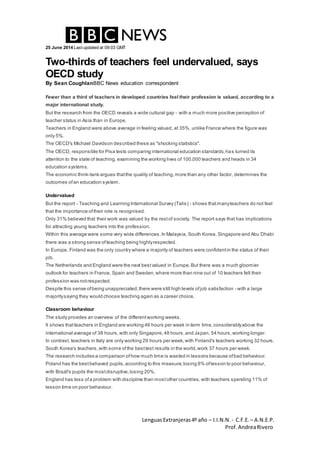
Undervalued teachers
- 1. Lenguas Extranjeras 4º año – I.I.N.N. - C.F.E. – A.N.E.P. Prof. Andrea Rivero BUSINESS 25 June 2014 Last updated at 09:03 GMT Two-thirds of teachers feel undervalued, says OECD study By Sean CoughlanBBC News education correspondent Fewer than a third of teachers in developed countries feel their profession is valued, according to a major international study. But the research from the OECD reveals a wide cultural gap - with a much more positive perception of teacher status in Asia than in Europe. Teachers in England were above average in feeling valued, at 35%, unlike France where the figure was only 5%. The OECD's Michael Davidson described these as "shocking statistics". The OECD, responsible for Pisa tests comparing international education standards, has turned its attention to the state of teaching, examining the working lives of 100,000 teachers and heads in 34 education systems. The economic think-tank argues that the quality of teaching, more than any other factor, determines the outcomes of an education system. Undervalued But the report - Teaching and Learning International Survey (Talis) - shows that many teachers do not feel that the importance of their role is recognised. Only 31% believed that their work was valued by the rest of society. The report says that has implications for attracting young teachers into the profession. Within this average were some very wide differences. In Malaysia, South Korea, Singapore and Abu Dhabi there was a strong sense of teaching being highly respected. In Europe, Finland was the only country where a majority of teachers were confident in the status of their job. The Netherlands and England were the next best valued in Europe. But there was a much gloomier outlook for teachers in France, Spain and Sweden, where more than nine out of 10 teachers felt their profession was not respected. Despite this sense of being unappreciated, there were still high levels of job satisfaction - with a large majority saying they would choose teaching again as a career choice. Classroom behaviour The study provides an overview of the different working weeks. It shows that teachers in England are working 46 hours per week in term time, considerably above the international average of 38 hours, with only Singapore, 48 hours, and Japan, 54 hours, working longer. In contrast, teachers in Italy are only working 29 hours per week, with Finland's teachers working 32 hours. South Korea's teachers, with some of the best test results in the world, work 37 hours per week. The research includes a comparison of how much time is wasted in lessons because of bad behaviour. Poland has the best behaved pupils, according to this measure, losing 8% of lesson to poor behaviour, with Brazil's pupils the most disruptive, losing 20%. England has less of a problem with discipline than most other countries, with teachers spending 11% of lesson time on poor behaviour.
- 2. But a more detailed analysis in England's schools shows that higher achieving state schools, rated as outstanding, have less disruption and more teaching time than weaker schools. And independent schools faced less disruption than state schools. Lesson lost to keeping discipline Teachers feeling valued Teachers' weekly working hours Brazil 20% Malaysia 84% Japan 54 hours Singapore 18% Singapore 67% Singapore 48 hours France 16% South Korea 16% England 46 hours Japan 15% Finland 59% United States 45 hours South Korea 14% Netherlands 40% Sweden 42 hours Italy 13% England 35% Spain 38 hours Finland 13% Japan 28% Poland 37 hours England 11% Denmark 18% South Korea 37 hours Denmark 10% Italy 13% France 37 hours Norway 9% Spain 9% Netherlands 36 hours Estonia 9% Sweden 5% Finland 32 hours Poland 8% France 5% Italy 29 hours In terms of more aggressive behaviour, in Brazil, Mexico, Australia and Sweden, there are reports of regular intimidation and verbal abuse towards teachers. The study examines how teachers are deployed - and whether the most experienced staff are where the need is greatest. The research reveals wide differences. In South Korea, the Netherlands and Chile, all high performing education systems in their regions, the most experienced teachers are more likely to be working in schools with the most disadvantaged pupils. In England, the trend is in the opposite direction, with the most experienced staff less likely to be in these more challenging schools. The study also provides a profile of the teaching profession. Most are women, with the average age 43 years old. Apart from Singapore, England has the youngest teaching force of any of the education systems in the survey. It has fewer head teachers over the age of 60 than any other developed country. The research found that many teachers were working in isolation - a majority did not use "team teaching" with another colleague and only a third observed other teachers' lessons. Almost half did not receive any feedback from senior staff. The report says that job satisfaction is improved by a greater sense of participation and collaborative working. "We need to attract the best and brightest to join the profession," said Andreas Schleicher, the OECD's education director. A spokeswoman for England's Department for Education said: "There has never been a better time to be a teacher - and there have never been more teachers in England's classrooms, with a rise of 9,000 in the last year. "We are incredibly fortunate to have many thousands of dedicated, hard -working teachers, committed to teaching excellence. Teaching is now one of the most attractive career paths for graduates, with a record number of top graduates now joining the profession." Labour's shadow education secretary Tristram Hunt said: "This report is more evidence that raising teacher quality improves children's learning." He called for all teachers to be qualified and "undertake continued professional development throughout their careers". Lenguas Extranjeras 4º año – I.I.N.N. - C.F.E. – A.N.E.P. Prof. Andrea Rivero
